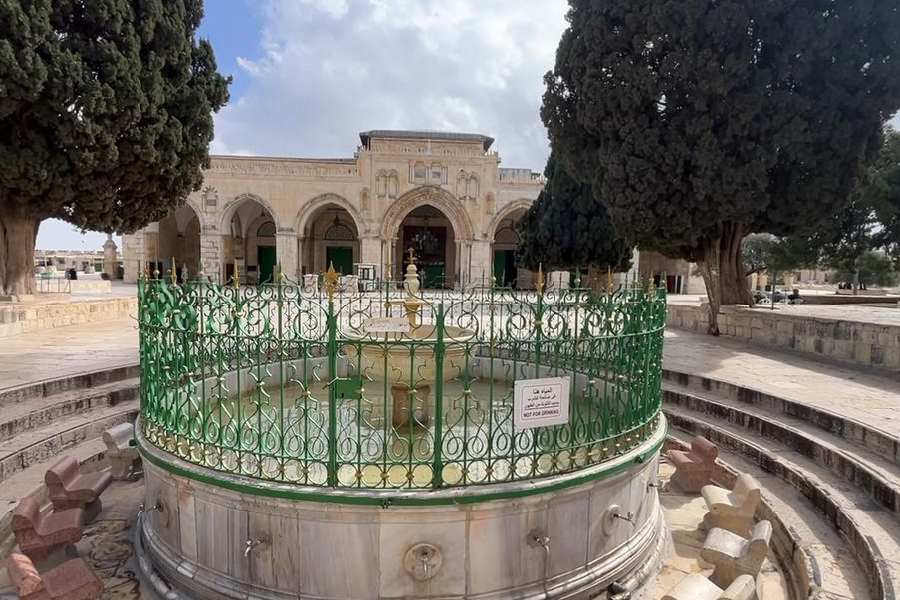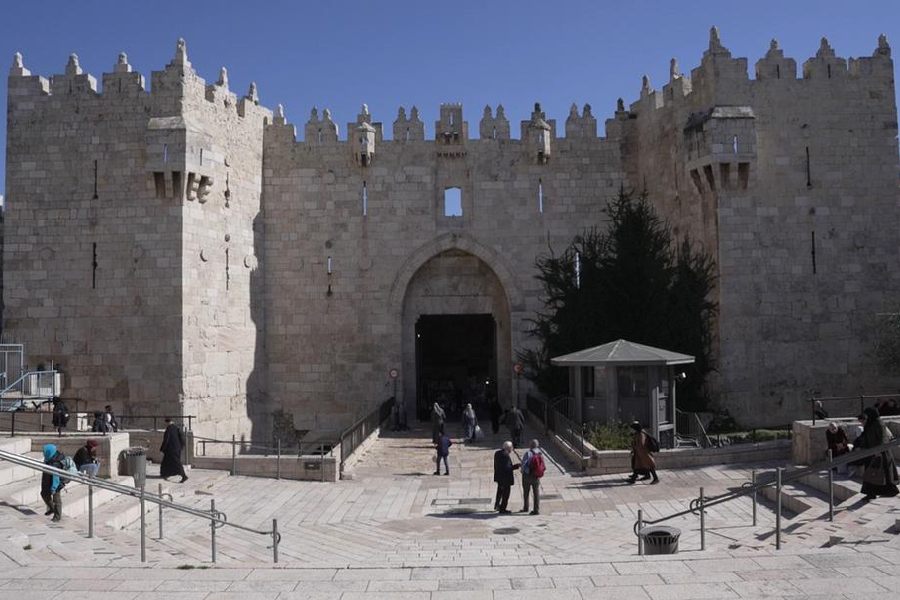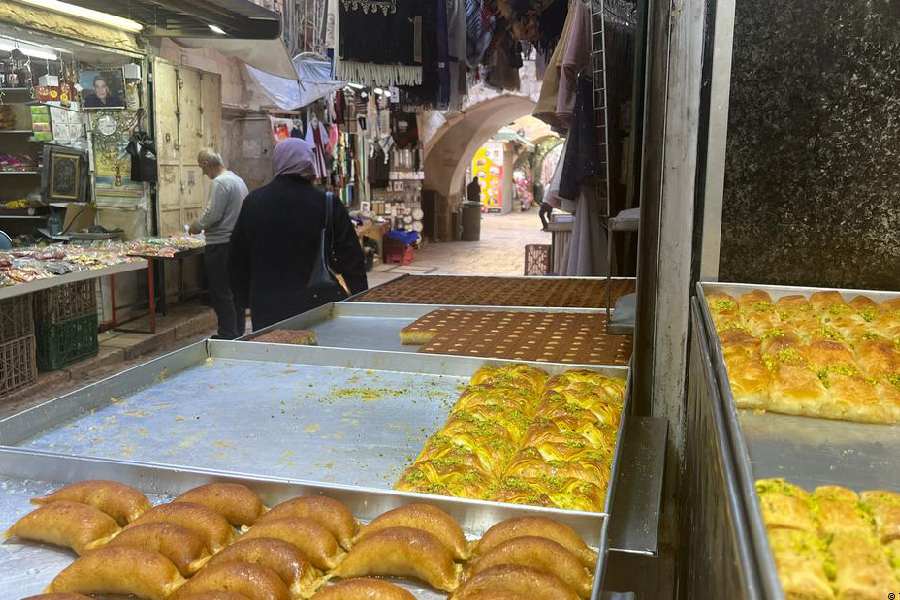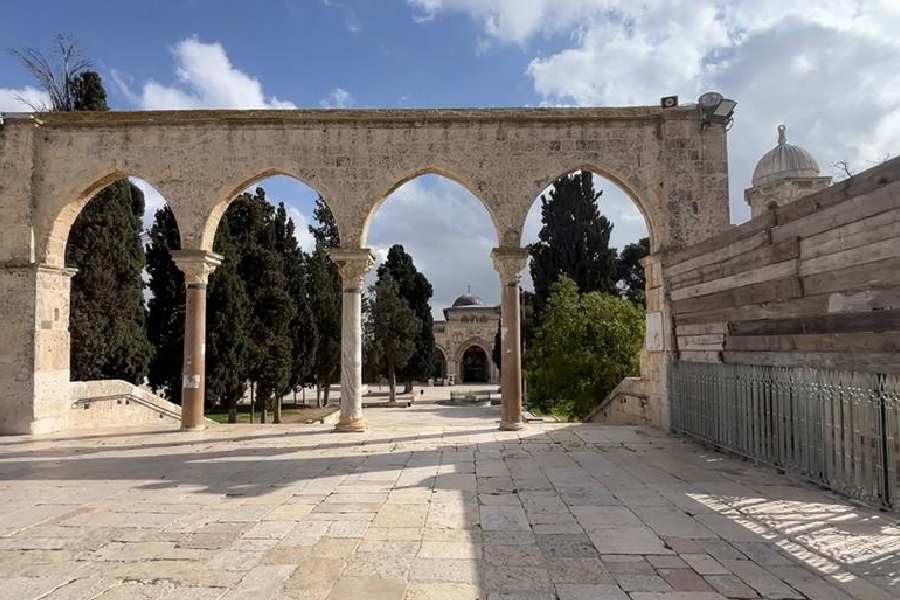A few days before the start of the holy month of Ramadan, the streets of East Jerusalem's Old City were quieter than usual. Unlike other years, there are no festive Ramadan lights lining the narrow alleyways. The mood is somber, with an air of uncertainty about how the holy month of fasting and prayer will unfold.
"We don't feel Ramadan," said Um Ammar, as she walked along Al-Wad Street, one of the main thoroughfares of the ancient city. The war in Gaza is on everyone's mind, she said. According to the Hamas-run Health Ministry, around 31,000 people have been killed and aid agencies are warning of a looming famine.
"We will have an iftar here. But there are a lot of people who won't be able to eat because there is no food in Gaza," she said, referring to the meal that breaks the fast at sunset. "When people sit around the table, what kind of Ramadan are we talking about? This is not Ramadan, it feels more like a wake to pay condolences," she said.
Her sentiments were echoed by others in the neighbourhood. Hashem Taha runs a spice shop on Al-Wad Street. "Jerusalem feels very sad, the people in Gaza are our people, they are family, and we are very affected by what we see there," Taha said.
A hope that Ramadan will remain calm
Over the years, shopkeepers and residents in this neighborhood have seen their share of tension and violence between Israeli border police and Palestinian residents, but most are hoping that the relative calm in Jerusalem will prevail this Ramadan.
Close to Taha's shop, Israeli border police stopped young Palestinian men to check their identity and belongings. "They are already making it very difficult and harassing people all the time," Taha said.This year, the war in Gaza, which began after Hamas militants attacked southern Israel on October 7, is casting a dark shadow on Ramadan. The holy month begins when the crescent moon is sighted, most likely on March 10 or 11.

The Al-Aqsa Mosque on the Haram al-Sharif (Noble Sanctuary) is one of the holiest sites for Muslims in East Jerusalem's Old City. For Jews the area is known as the Temple Mount Deutsche Welle
In the past, tensions have centered around the Al-Aqsa Mosque compound, known to Muslims as Haram al-Sharif or Noble Sanctuary, and to Jews as the Temple Mount.
Flashpoint: Al-Aqsa Mosque
During Ramadan, hundreds of thousands of Muslims usually gather to pray on the large plaza in front of the Al-Aqsa Mosque.
In February, Israel's national security minister, far-right politician Itamar Ben-Gvir called for restrictions on the number of worshippers that could go to the mosque. Attempts by Israel to impose age-related and other restrictions on Palestinians entering the holy site, which is sacred to Muslims and to Jews, have previously led to confrontations between police forces and worshippers.
Hamas — listed as terrorist organization by Israel the US, the EU, Germany and others — has also sought to use the importance of the holy site to Palestinians and Muslims worldwide to raise the stakes. Last week, in a televised speech, Hamas leader Ismail Haniyeh called on Palestinians to march to the Al-Aqsa Mosque on the first day of Ramadan.
This week, on March 5, the Israeli government said it wouldn't impose any new restrictions on worshipper numbers. "During the first week of Ramadan, worshippers will be permitted to enter the Temple Mount in numbers similar to previous years," said a statement released by the Israeli Prime Minister's office. "Ramadan is sacred to Muslims; its sanctity will be upheld this year, as it is every year." But, it also added, "a weekly assessment of security aspects will be carried out."
At the same time, there have also often been scenes of tension and violence in other parts of Israeli-annexed East Jerusalem, particularly around Damascus Gate and its plaza — one of the main gates leading into the Old City — as police prevented young Palestinian residents from gathering on the steps during Ramadan evenings. It is still unclear whether Palestinians from the occupied West Bank will be able to enter Jerusalem.

Damascus Gate is one of the main gates leading to the Old City from East Jerusalem Deutsche Welle
Al-Aqsa aims for prayers in 'calm and tranquility'
Religious officials have welcomed the government's decision.
"We are very happy that in this blessed month there are things that have begun to become clear to Muslims regarding the opening of the doors of Al-Aqsa Mosque to all visitors without age restriction," Sheikh Azzam al-Khatib told DW in Jerusalem.
He is the director of the Jerusalem Waqf, the body responsible for implementing Jordanian custodianship over Islamic and Christian holy sites in Jerusalem and beyond.

Ramadan this year is likely to be a more somber affair than usual Deutsche Welle
"Our goal is prayer, worship, and fasting there, and the ability to reach the mosque in total calmness and tranquility. And also to leave the mosque in total calmness and tranquility," he said.
The start of Ramadan had also been set as a deadline of sorts for recent efforts by US, Qatari and Egyptian mediators to broker a new hostage deal and temporary cease-fire between Israel and Hamas. However, an agreement to release the 134 Israeli hostages still believed to be held by Hamas remains elusive.
There had been hopes in Gaza that a ceasefire, even a temporary one, would bring some respite. At least there would be less fear and anxiety, Nour al-Muzaini told DW via WhatsApp. The 36-year-old has been on the move for the past six months — from Gaza City to Khan Younis and then to the border town of Rafah.
"In Ramadan we observe rituals that are an integral part of our normal lives, such as breaking the fast, praying and acts of worshipping. It's a month of mercy and forgiveness, but it's difficult to observe when you're displaced," he said.
A somber Ramadan
Tamer Abu Kwaik is most worried about his children. He and his family are now living in a tent in Rafah, after making a similar journey from northern Gaza. Ramadan, said Abu Kwaik, has always been a special time for the family.
"In the days before the war, we used to create a beautiful atmosphere for the children. But now, amid the war, we do our best to put smiles on their faces. However, as I decorate the tent, I realize it won't be as great as it used to be," he said in a WhatsApp voice message from Rafah.
The uncertainty over what lies ahead has been particularly difficult to cope with.
"We are trying to cope with this crisis psychologically, hoping the war will end soon and that there will be a cease-fire so we can return home," Abu Kwaik said. "My own house has been demolished; part of a building that has been completely destroyed. I often wonder what I will do when the war ends."
If no new hostage deal is reached, Israel has said it would extend its ground operation to Rafah, where an estimated 1.4 million displaced Palestinians are currently seeking shelter.
Prime Minister Benjamin Netanyahu has reiterated that "the IDF [Israel Defense Forces] will continue to operate against all Hamas battalions throughout the Strip — and that includes Rafah, Hamas' last stronghold. Whoever tells us not to operate in Rafah is telling us to lose the war — that will not happen."











